Virginia’s status as a purple state means that many of its local and national elections are often up in the air.
The stakes of issues facing Virginians in 2024 are unlikely to change before Nov. 5: What challenges and risks lie ahead for the commonwealth? What are candidates' proposed policies to tackle these issues — if they have specific, or realistic, plans at all?
What VPM News found from speaking with experts and candidates is reported below. But we’d also like to hear from you: What questions about the upcoming elections do you have?
Jump ahead to a specific issue: Abortion | Climate change | Education | Fentanyl | Foreign policy | Gun control | Housing | Immigration | Inflation and employment
Abortion
The commonwealth is the only state in the South that hasn’t restricted abortion access since the 2022 U.S. Supreme Court decision in Dobbs v. Jackson Women’s Health Organization, which gave state legislatures the right to limit — or ban — access to abortion.
Ahead of the November election, Democratic candidates in U.S House races are urging voters to turn out to protect abortion rights. Republican congressional candidates, especially those in Virginia’s most competitive races, are adhering to anti-abortion stances and saying the issue should be dealt with by state legislatures.
The winner of Virginia’s congressional races could help determine if and how abortion is dealt with federally. In July, Senate Republicans blocked the Reproductive Freedom for All Act, sponsored by Virginia Sen. Tim Kaine, a Democrat. The bill supported a person’s right to make reproductive decisions without government involvement. It did put restrictions on abortions after fetal viability — "generally considered to be around 23 or 24 weeks" — but included exceptions when the health of the pregnant person was at risk. It also provided protections for access to contraceptives and other reproductive health services.“It’s more urgent than ever that we protect reproductive freedom,” Kaine said after the bill failed.
He promised to continue working on passing the legislation in order to “protect access to abortion and contraception.”
Kaine is running for re-election against retired Navy Capt. Hung Cao, who identifies as "pro-life."
“Make no mistake: the right to life is one of the biggest differences between me and Tim Kaine,” Cao’s campaign website says.
He’s critical of Kaine’s position, which allows for abortions after 21 weeks. Abortions occurring on or after this stage of pregnancy, often referred to as “late-stage abortions” account for 1% of abortions in the U.S., according to KFF.
Democrats running in Virginia’s most closely contested U.S. Congressional races are vowing to support federal legislation protecting reproductive rights.
Missy Cotter Smasal, who is running against Republican U.S. Rep. Jen Kiggans in Virginia’s 2nd District, said in an email statement that she hopes to “codify reproductive rights and abortion access into law so Virginia women have the protections and access to healthcare necessary for bodily autonomy.”
Kiggans did not respond to questions VPM News emailed her campaign. But the incumbent, who represents a large number of military servicepeople and veterans, voted for a defense spending bill amendment that would have prohibited active duty members from being reimbursed for travel costs incurred while seeking abortion services.
Kiggans defended her vote in a New York Times interview saying, “Taxpayers should not be paying for elective surgery.”
In Virginia’s 7th District, Democrat Eugene Vindman said via email that he wants to see his daughter “grow up with the same rights as her mother and mother before her.”
Vindman is running against Republican Derrick Anderson, who also described himself as "pro-life" and said in an online post “that’s how I will serve in Congress.”
His campaign did not respond to requests for comment. Any proposed federal abortion legislation must pass by a majority in the House and garner more than 60 votes in the Senate before making it to the president’s desk to be signed into law. (Adrienne Hoar McGibbon)
Climate change
Virginians are feeling the effects of climate change.
The prolonged heat dome that set temperature records in the Midwest and Northeast this June also baked Virginia — part of a doubling in heat wave frequency across the U.S. from 1980-2023.
In 2024, the commonwealth has already surpassed the number of heat-related hospital visits reported to the Virginia Department of Health in 2023 — and VDH is continuing to collect that data until the end of September.

Meanwhile, more than half of Virginia’s electricity is produced with natural gas, a methane-based, carbon dioxide-emitting fuel source that contributes to global warming.
About three-quarters of Virginians said they believe global warming is real, according to 2023 survey data compiled in Yale Climate Opinion Maps. A similar number of Virginians said they support a range of environmental policies, including:
- funding renewable energy research
- generating electricity from renewable sources
- regulating carbon dioxide as a pollutant
- requiring fossil fuel companies to pay a carbon tax
- teaching about global warming in schools
The federal and local candidates who win contests this November will have a say in how and whether those policies are pursued.
Democrats and Republicans running for federal office have some points of agreement, particularly on natural resources protections. Republican U.S. Rep. Rob Wittman (VA-01) and Democrat Sen. Tim Kaine both support federal programs to reduce pollution in the Chesapeake Bay and mitigate coastal flooding. Leslie Mehta, Wittman’s Democratic challenger, includes a commitment to addressing climate change on her website — but doesn’t outline specific policies.
Climate bills, like the Inflation Reduction Act, have been subject to dozens of partial repeal votes by Republicans in the U.S. House of Representatives seeking to rein in government spending.
Candidates are also split on energy policy: Virginia Republican Senate candidate Hung Cao supports expanding U.S. gas and oil production. Kaine, his opponent, notes his support for the IRA on his campaign website, pointing to funds to develop battery storage and other clean energy technologies included in the law.
Locally, Richmond’s next mayor and council representatives will inherit RVAGreen2050 and its connected short-term Climate Equity Action Plan 2030. The new administration will control the recently established and growing Office of Sustainability, which oversees grant opportunities, sustainability standards, and collaboration with residents, businesses and nonprofits.
However, government transparency, housing and education have taken precedence over climate issues in mayoral forums and in candidate statements. SunriseRVA and the Sierra Club Virginia Chapter have weighed in, endorsing candidates based on support for environmental justice policies. (Patrick Larsen)
Education
In the 2021 Virginia governor’s race, Glenn Youngkin ran on issues like a ban on the teaching of critical race theory, a vow to restrict the rights of transgender students, book censorship and an end to pandemic mask mandates — though he toned things down a bit in 2023.
But this year, based on the priorities of candidates vying for Virginia’s congressional seats in November, it doesn’t appear that education will be as central an issue as it has been during the past few years.
Critical race theory isn’t mentioned on candidates’ websites, and only Democratic 7th District nominee Eugene Vindman references book banning; he opposes the practice.
Karin Kitchens, an associate professor of political science at Virginia Tech, said culture war issues aren’t likely to play as significant a role in this year’s Congressional races.
“I do think it’s dying down a little bit, unless you’re Florida,” Kitchens said.
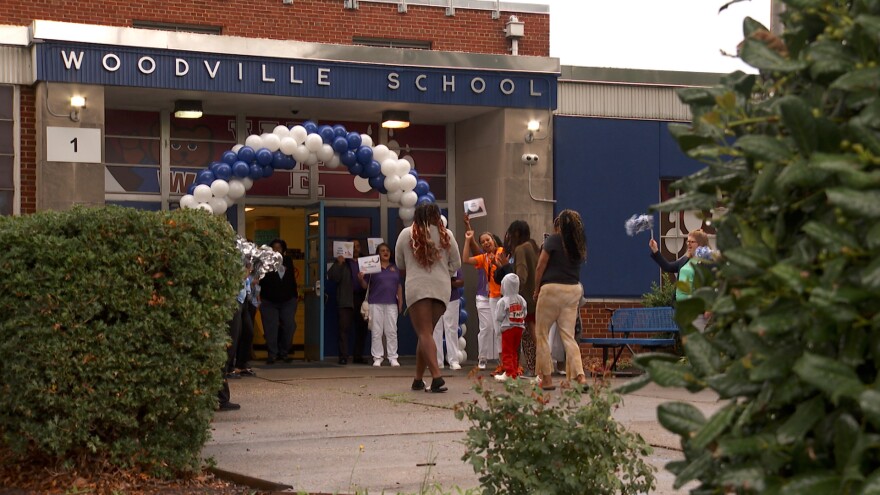
Instead, Kitchens expects most conversations about education to focus on public versus private funding issues — especially in light of Project 2025, a widely circulated proposal of Republican priorities that includes defunding the U.S. Department of Education in favor of a privatized education system.
Historically, Kitchens said, the U.S. has taken the approach that public education is best. But in the past 15 years or so, there’s been an increase in the push for vouchers that would allow families to use public funding to send their children to private schools.
Hung Cao, who is running to unseat Democratic U.S. Sen. Tim Kaine, mentions school choice on his website — as does Mike Clancy, the Republican nominee in the 10th Congressional District.
“As a society, promoting school choice that gives real education options for children and parents is critical,” Clancy’s website reads. “Parents not only deserve the ability to have school choice, they deserve to be treated with respect as the ultimate decision makers for their children.”
On his campaign site, Vindman, the 7th District Democrat nominee, disagrees, writing: “As a product of public schools and the proud father of two kids in public schools, I recognize how critical investment in our public education is to ensure that every child can succeed.”
Kitchens said the conversation about vouchers isn’t necessarily a traditional Republican versus Democrat issue. Many rural Republicans don’t support vouchers because “in our region, public schools are one of the largest employers.”
“There's not going to be a lot of support for [a separate, privatized education system] or really the resources for it,” she said. “It's just not going to work out the same way it does in an urban area, where there are already existing private schools.”
Other education topics Kitchens expects to come up in political debates — especially as school starts this fall — include school safety and campus protests.
Democratic 2nd District candidate Missy Cotter Smasal’s website states “she created a ‘locked doors’ petition that produced a concrete plan to make our public schools safer. And now, schools across Virginia Beach have locked doors with cameras and buzzers.”
None of the Republican candidates in the 2nd or 7th District races — the only Congressional races in Virginia deemed competitive by the nonpartisan Cook Political Report — mention education specifically as a priority on their websites.
Kitchens sees debates over campus protests as part of the culture wars because of the ongoing tension between what’s considered free speech and what’s seen as hate speech. She pointed to an op-ed by Republican 7th District candidate and Virginia Tech alum Derrick Anderson condemning pro-Palestinian protests on Virginia college campuses.
“I think in general, we've seen a lot of Republican pushback about what should be allowed on campuses,” Kitchens said. “I think that this kind of is going to fit into that narrative.” (Megan Pauly)
Fentanyl
Even though overdose deaths are declining in Virginia, fentanyl and other synthetic opioids continue to be the leading cause of drug-related deaths in the state, according to the Virginia Department of Health. Nearly 80% of overdose deaths in the commonwealth are linked to synthetic painkillers, equaling about five per day.
Fentanyl is a manufactured opioid that’s about 100 times more potent than morphine. The drug (also known by its brand names Duragesic, Abstral, Subsys and Ionsys) is an effective painkiller when monitored by a medical professional.
According to the US Drug Enforcement Administration, some drug manufacturers are mixing potentially deadly amounts of fentanyl into pills, powders and nasal sprays — and shipping the illegal substances into the United States. Illegal dealers are also mixing the potent narcotic with other drugs, like heroin, methamphetamine and cocaine, increasing the likelihood of an overdose.
Nearly 108,000 people died from overdose deaths in America in 2023, but those numbers are declining for the first time since 2018. Overdose deaths in Virginia peaked at 2,622 in 2021.
According to US Customs and Border Protection, fentanyl is primarily smuggled into the country through legal ports of entry. Over 90% of fentanyl seized at the borders or at more than 110 drug checkpoints is brought in by US citizens.
In 2023, Gov. Glenn Youngkin launched a plan to fight what his administration called Virginia’s “fentanyl crisis,” arguing the drug’s epidemic was both a national security concern and a public health emergency. Legislation sponsored by state Sen. Mark Obenshain (R–Rockingham) banned pill presses, aiming to combat fentanyl making its way into counterfeit prescription drugs. Penalties for fentanyl possession were also increased after lawmakers passed a bill by state Sen. John McGuire.
Before the Youngkin administration launched the initiative, the state saw a 5% decrease in opioid deaths in Virginia from 2021 to 2022. (The governor’s goal is to reduce opioid overdoses in Virginia by 20%.)
Republicans and Democrats at the federal level have also passed legislation focused on addressing fentanyl’s deadly impact. In 2018, former President Donald Trump signed the bipartisan FEND Off Fentanyl Act, which placed sanctions on Chinese and Mexican drug cartels importing illicit substances into the country.
In 2024, President Joe Biden signed another bipartisan bill, The END FENTANYL Act, which requires CBP to update its inspection procedures to better detect fentanyl coming through ports of entry. Earlier this year, a bipartisan group of US senators developed the Border Act, which was meant to address illegal immigration, and included funding for additional personnel and new technology to prevent fentanyl crossing through ports of entry and the southern border.
Senate Republicans, including some who authored the bill, eventually voted against the legislation at Trump’s urging.
In a message Trump posted on his social media platform, Truth Social, he called the legislation “a great gift to the Democrats, and a Death Wish for The Republican Party.” Immigration has consistently been a top issue in the 2024 presidential campaign, and polls regularly show more Americans trust Trump over Democrats to address the influx of migrants illegally crossing into the country.
Broadly, Republicans have focused their fentanyl strategy on closing the U.S.–Mexico border.
Hung Cao, the Republican nominee for Senate, wrote about fentanyl on his campaign website’s border security page, where he refers to illegal immigrants as an “invasion.”
“We will build the wall, we will secure the border through advanced technology, we will support the Border Patrol and border states, and we will repel this invasion,” he wrote.
During a campaign stop in Bristol, Cao’s campaign manager did not make him available for an interview.
The campaign of Derrick Anderson, the Republican nominee in Virginia’s 7th Congressional District, did not respond to multiple requests for this article.
In an interview with the Fredericksburg Free Press before the June primary election, Anderson also spoke about a solution to the fentanyl crisis through border security.
Eugene Vindman, Anderson’s Democrat opponent, told VPM News through a spokesperson that Congress should provide more resources to local communities and equip border enforcement agents.
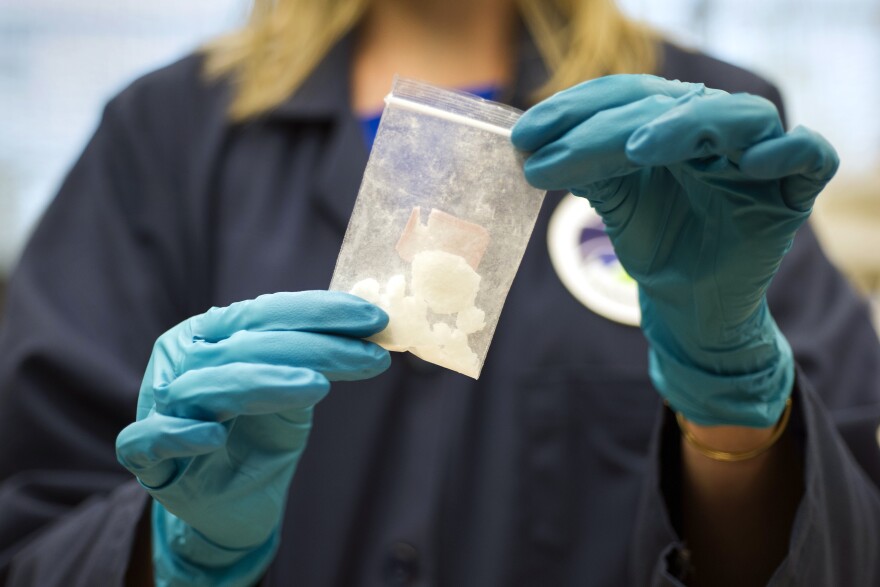
U.S. Sen. Tim Kaine, the incumbent Democrat running for re-election, said he supported more inspection technology at border crossings. The bipartisan border bill that lost Republican support after Trump lobbied against it would’ve funded Low Energy Portal scanning technology, which allows CBP officers to more quickly scan vehicles to detect illegal substances.
“It’s not cheap, but we finally have it developed to a degree where we can begin to basically inspect 100% of trucks that come across the border,” Kaine told VPM News. “The cartels know, ‘Well, they only got the technology to expect 1 out of every 10.’ So, they'll run the risk.”
Kaine also said prevention was a key aspect of combating the human cost of fentanyl, pointing to his support of federal grants for specialized courts and substance abuse treatment programs.
Leslie Mehta, the Democratic nominee in the 1st Congressional District, said that because fentanyl is often consumed unknowingly, it's a different policy challenge than previous substance epidemics.
“I don't think that there's one stop answer to the Fentanyl crisis at this point.,” she said.
In a later email, Mehta said there was a need to focus on health outcomes, provide medication and test strips — and there was “critical work” to do to address how fentanyl enters the country .
Mehta’s opponent, incumbent Rep. Rob Wittman, did not respond to questions sent by email. (Adrienne Hoar McGibbon and Jahd Khalil)
Foreign policy
American foreign policy has a direct effect on Virginia: Defense-related spending makes up roughly 20% of the commonwealth’s economy and it hosts the largest naval base in the world. The defense industry is also heavily concentrated in Northern Virginia and Hampton Roads, providing jobs and revenue.
Where does foreign policy happen in Central Virginia?
Central Virginia hosts a number of important military installations as well. Albemarle County has the National Ground Intelligence Center, Prince George County has Fort Gregg-Adams, Caroline County hosts Fort Walker and Fort Barfoot is in Nottoway County. The University of Virginia is also home to The Judge Advocate General's Legal Center and School, “the preeminent legal institution in the federal government that enables successful military operations which comply with the rule of law in both peace and war.”
The Richmond distribution center for the Defense Logistics Agency (in Chesterfield County) provides services for the Foreign Military Sales program, of which Israel and Ukraine are major clients.
Here’s what some of the congressional candidates had to say. Republicans Hung Cao (running for Senate) and U.S. Rep. Rob Wittman (VA-01) did not respond to interview requests or to an emailed set of questions.
Israel–Hamas war
According to a recent poll from Virginia Commonwealth University's L. Douglas Wilder School of Government and Public Affairs, 39% agreed that “Israel was justified in taking military action in Gaza, but it has now gone too far,” while 29% said Israel was justified to continue “aggressive military action.” And 15% “say Israel should not have taken any military action in Gaza.”
(VCU took issue with the poll — specifically in how it took up the role of University President Michael Rao’s in a VCU Health deal. A Gallup poll from around the same time said that 48% of US adults disapproved “of the military action Israel has taken in Gaza.”)
Protests against the Israeli response have embroiled Virginia college campuses; one of Hamas’ remaining hostages also spent some of his childhood in Richmond.

Israel has killed over 40,000 Palestinians in Gaza in its response to a Hamas attack on Oct. 7 that killed roughly 1200 people and took over 200 hostage. The death toll in Gaza may be an undercount and doesn’t list cause of death, distinguish between civilians and combatants and doesn’t count people buried in destroyed buildings.
The United Nations estimates another 10,000 people could be buried under the 63% of structures in Gaza that have been damaged. As of June, 96% of the population was facing acute food insecurity.
The death toll and humanitarian crisis has led international courts to say Israel’s actions could constitute a genocide, and issue arrest warrants for both Hamas leader Yahya Sinwar and Israeli Prime Minister Benjamin Netanyahu. The conflict has also spread farther to Syria, Iran, Lebanon and Yemen.
Democratic Sen. Tim Kaine said at an early August campaign stop in Floyd that a ceasefire was desperately needed, but stopped short of calling for a permanent ceasefire.
“We have to get the ceasefire and hostage release, because the suffering of Gazans is immense,” Kaine told VPM News. “We gotta bring that to a close, and then make the ceasefire permanent.”
Leslie Mehta, the Democratic nominee in Virginia’s 1st Congressional District, said conditions on aid to Israel should be considered.
“We obviously support our ally, Israel, but we also need to make sure that the Palestinian people are able to be safe and in their homes as well,” she said.
Democrat Alexander Vindman, in Virginia’s 7th District, did not directly address his support for an Israel–Hamas war ceasefire in a question about his policy preferences, saying Israel had an “unequivocal right to defend herself.”
His Republican opponent, former Green Beret Derrick Anderson, responded to a question about supporting a ceasefire by saying he stood “with Israel 100%.”
“I’ll do everything I can to fight anti-Semitism and support the Jewish people,” he said through a spokesperson.
Anderson did not answer whether the US should investigate the possibility American weapons were used in war crimes in Israel. Vindman did not answer either, instead saying he supported investigating possible Russian war crimes in Ukraine.
Russia–Ukraine war
Since Russia invaded Ukraine in February 2022, tens of thousands of soldiers have died, though overall fatality counts are difficult to come by. According to the UN, over 35,000 civilians have been killed, mostly in Ukraine, and July 2024 was reportedly the deadliest month for civilians since October 2022.
The war is a key issue in American–European relations and has food security implications across the world.
The US has appropriated an extra $174 billion for Ukraine since February 2022, according to a government watchdog for the money. Some Democrats and Republicans have scrutinized the level of support the US has provided, including Anderson.
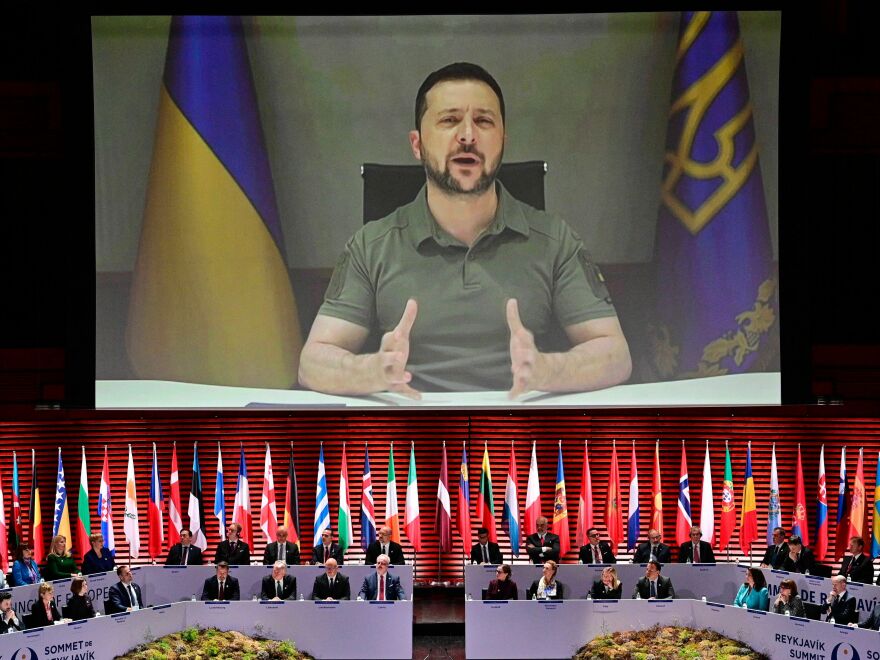
“We can’t write a blank check or send endless amounts of cash to Ukraine, but we need to make sure they can beat Putin because a win for Putin puts us and our allies at risk,” he said in an emailed statement through a spokesperson.
Vindman, who gained public notoriety due to his role in the Ukraine impeachment proceedings against former President Donald Trump, supported using frozen Russian assets to provide aid to Ukraine.
“Our support should be in both military and economic terms, which can partially be funded by going after the bank accounts of Putin’s billionaire cronies supporting his war effort,” he wrote in an email. “Ukraine stands on NATO’s borders and we cannot allow Russian aggression to threaten our NATO allies.”
Mehta also expressed support for aid to Ukraine.
“One of the things that's important is not just making sure that we have and maintain democracy in the United States, but also around the world,” she said.
Kaine’s voting record has been supportive of support to Ukraine, which Hung Cao, his Republican opponent for Senate, was critical of in social media posts on his Facebook and Twitter feeds. His campaign did not agree to an interview or respond to questions.
China
China is Virginia’s second-largest export market, after Canada, with $2 billion of exports headed there. Globally, the commonwealth exported $22.4 billion of goods in 2023 according to the US Trade Representative, and exports in Virginia support about 75,000 jobs.
Chinese economic and military power worldwide has increased, bringing it and the US into competition. Congress recently passed a law that would close down social media app TikTok unless it is sold by its Chinese parent company.
Mehta said she felt that TikTok was singled out amid social media companies, but in an interview generally did not expand on where the US should cooperate or conflict with China.
“In this kind of global world, I think one of the things that is concerning is how do we continue to do business with a country like China, but also maintain our national security,” she said.
Other candidates have focused on the stance that China is a threat.
“I believe strongly in country over party and I believe that there’s bipartisan agreement behind the fact that America needs to beat China,” said Anderson through a spokesperson. “There’s no question that China’s economic and military ambitions threaten America’s safety. We stand for freedom and democracy; they stand for oppression and a terrible future for our world.”
Vindman cited specific policy areas to address regarding China.
“We need to take on China and be as competitive as possible,” he said in his emailed statement, pointing to his support for a bill popularly known as the CHIPs Act, which aims to bolster the American semiconductor industry. “Beyond the CHIPs Act, we should be looking for other ways to bring back key supply chains and create more good-paying jobs that strengthen our national security. (Jahd Khalil)
Gun control
Gun control could prove to be a pivotal issue in the commonwealth’s November election.
Andy Goddard, legislative director for the Virginia Center for Public Safety, said Virginia legislators headed to Washington could change the tone around gun control.
“We’re in a situation where things have become so politicized that even people who agree with the intent of legislation are somewhat constrained by the party they're in,” said Goddard, whose nonprofit works at all levels of government on nonpartisan gun legislation.
Goddard began working across party lines advocating for stricter gun laws after his son Colin was wounded during a mass shooting at Virginia Tech in 2008.
“When I first started this, I got a mix of Dems and Republicans that were supportive of sensible measures,” Goddard said.
During this year's General Assembly session, Goddard lobbied for over two dozen gun-control-related bills, including a proposal that would have offered tax credits to gun owners who purchased a safety or storage device. Another sought to restrict the sale of assault weapons.
Around 30 gun control bills were passed by the Virginia Legislature in 2024, but were vetoed by Gov. Glenn Youngkin.
Philip Van Cleave, president of the Virginia Citizens Defense League, said this year’s General Assembly proceedings show how important the topic of gun control is to Virginia voters.
Van Cleave and his Second Amendment rights nonprofit lobbied against legislators trying to tighten the state’s gun regulations and have taken a number of issues to court in the hopes of changing how some gun laws are enforced.
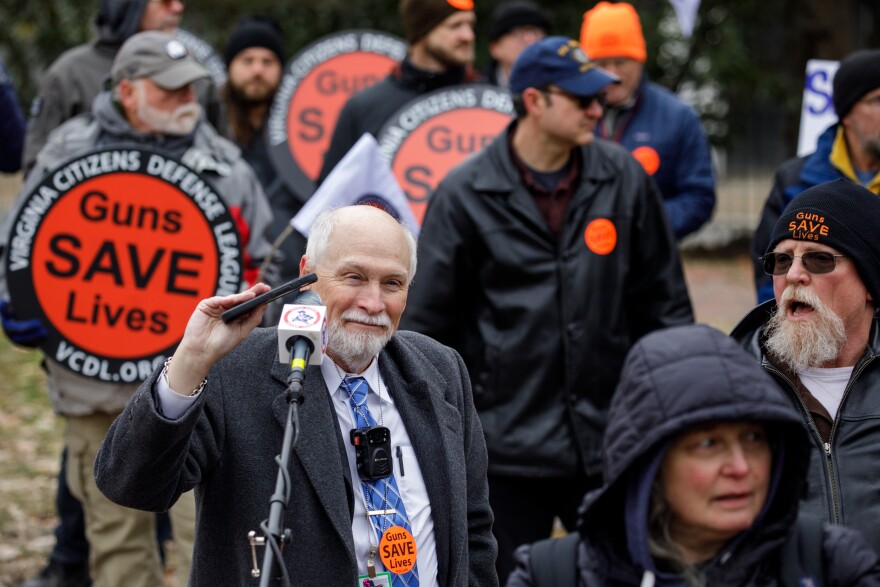
As an example of a law he’d like changed, Van Cleave referenced the ability of law enforcement or family members to petition a judge to temporarily remove a person's firearms — if they’re found to be at risk of harming themselves or someone else.
“We’ve got a lot of work in Virginia. We’re fighting some laws in court right now, because what’s happening with these laws has nothing to do with gun safety like they claim it is,” Van Cleave said. “It's a war on gun owners.”
Although the federal election won’t change the makeup of Virginia’s state legislature, Van Cleave stressed that those who care about gun control should participate in every election.
“There's no doubt that gun owners will continue to have more years of misery trying to protect their rights,” Van Cleave said. “If you're a gun owner and you don't vote or are not registered to vote, you're out of your mind.”
Goddard also encouraged voters to participate in this year's election and to learn which candidates support the issues they care about.
“I would say, if you don't know enough to know where a particular politician stands on a number of issues, then educate yourself,” Goddard said. “Democracy works with an educated voter, regardless of if they have a ‘D’ or an ‘R’ next to their name. Find out who you’re voting for.”
This year’s U.S. Senate contest pits Democratic incumbent Sen. Tim Kaine against Republican challenger Hung Cao, a Navy veteran.
In lieu of an interview, Cao’s campaign directed VPM News to hiscampaign website, where the candidate says: “The Constitution is clear regarding the Second Amendment. I will always protect the right to self defense. … We must send a strong message to violent offenders. Gun-related violence must be prosecuted to the fullest extent of the law.”
Cao’s campaign included a statement that claims the jurisdictions with the most gun control laws also have the most gun violence — a claim Kaine described as “demonstrably false.”
“In the Senate, Tim Kaine helped pass the first federal gun safety legislation in decades and is leading efforts to require universal background checks, keep dangerous weapons off the street, and expand mental health services,” Kaine spokesperson Michael Beyer wrote in an email.
Kaine’s campaign website elaborates a bit: “[H]e supports universal background checks, banning assault weapons and high-capacity magazines, and providing more support for people facing mental health challenges.”
After incumbent Rep. Bob Good failed to capture the Republican nomination in the 5th Congressional District this year, voters will choose between Republican state Sen. John McGuire and Democrat Gloria Witt.
McGuire’s campaign did not respond to an interview request.
His candidate website describes him as “Pro-Life. Pro-Gun. Pro-Trump.” And during McGuire’s time in the legislature, he regularly cast votes opposing gun control measures.
In February, McGuire voted against a proposal that would have prohibited the open carry of semi-automatic firearms. While a state delegate in 2022, he also voted to reduce penalties for carrying a concealed weapon without a permit and co-sponsored a bill to repeal the commonwealth’s red flag law.
Witt sees issues around gun safety differently.
“I support the Second Amendment, however, we need common sense reform to address the real and urgent threats posed by military grade weapons in our nation,” she wrote in an email to VPM News. “One critical aspect of this reform involves rethinking the federal definition of a machine gun. By updating and clarifying this definition, we can close dangerous loopholes and work towards a ban on these military grade weapons.”
The 7th Congressional District race is between Republican Derrick Anderson and Democrat Eugene Vindman — both military veterans. The seat’s currently held by Democratic Rep. Abigail Spanberger, who is the only candidate currently to have declared for Virginia’s gubernatorial race.
The Anderson campaign responded to some questions posed by VPM News, but not about guns.
Two years ago, the candidate attended a gun show in Fredericksburg and posted photos from the event on social media.
“Our 2nd Amendment right[s] are sacred and not to be infringed upon,” Anderson wrote in the post. “As a former Green Beret, I’ll be a strong advocate for gun owners in the halls of Congress. You can count on it!”
Vindman’s campaign manager, Jeremy Levinson, said in a statement: "Eugene likes to highlight how his son's school in [Prince William County] had to go into lockdown because a gun was found at his school as a personal example of the need for comprehensive reform. As a responsible gun owner and a veteran, he knows we need to pass the reform to keep our schools and communities safe.” (Lyndon German and Billy Shields)
Housing
Virginia home prices have risen at a faster rate than wages, and rents in the Richmond area have risen more quickly than elsewhere in the country. While affordability can be addressed by local governments, candidates for federal office also have the opportunity to affect people’s ability to find housing.
The median price of a single family home sold in the Richmond metropolitan area — which includes Chesterfield, Hanover and Henrico counties — in 2014 was between $200,000 and $240,000, depending on the month, according to data from the Central Virginia Regional MLS. A decade later in June, the median sale price was just under $450,000 — 7.3% higher than the nationwide median.
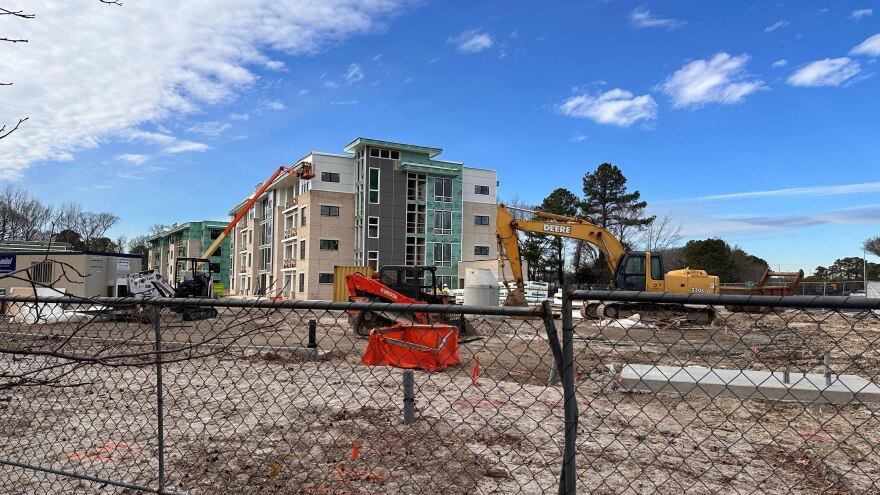
That means at current interest rates of roughly 6.5% for a 30-year fixed mortgage, the median buyer in Richmond would have a monthly payment of more than $2,600. But that’s only if they’re able to come up with $90,000 for a 20% down payment.
Putting down 10% would raise the monthly mortgage payment above $2,900.
Richmonders are less likely to be able to afford an average home now than during the Great Recession, according to the Housing Affordability Index, a measurement of a region’s median household income as a percentage of what is necessary to qualify for a median-price home at current interest rates.
The picture isn’t much rosier for people in the market for condos and townhomes — whose median sale price peaked in May at $381,920 — or for renters.
The median Richmond household — which earns just under $59,000 a year, per the most recent U.S. Census Bureau data — technically can’t afford to rent the average two-bedroom apartment in the city. That’s if people abide by the conventional guideline advising they spend no more than 30% of their gross monthly income on housing.
An analysis from RentCafe indicates that the average apartment rent in Richmond was $1,483 in March — an increase of more than $500 since March 2017.
Those hunting for an apartment could also soon see a tighter market. With high interest rates, multifamily developers told Renee Haltom, Richmond regional executive and vice president of research communications at the Federal Reserve Bank of Richmond, that new deals have slowed down.
“You would need high-rent growth to make the deal work from a developer's perspective, and they just don't see rental growth in the future as possibly being able to keep up with those other costs,” she said. “There's a really interesting short-term, medium-term thing happening in multifamily [housing], which is there's been a lot of building happening in the last few years, all of which is sort of hitting the market now. That's actually potentially putting downward pressure on rents in some places.”
Haltom spoke to VPM News from a nonpartisan perspective, not commenting on any particular campaign or candidate.
One area where things are comparatively good for Richmond-area buyers is that as of June, the average single-family home is selling for just 2.2% over the original listing price.
An influx of people moving to Richmond, particularly from Northern Virginia, during the COVID-19 pandemic drove up demand to where the average buyer in April 2022 was paying more than 8% above asking price.
In contrast, data from CVR MLS shows that the average single-family home buyer in metro Richmond paid below asking in every month from the beginning of 2008 to summer 2020.
Democratic U.S. Sen. Tim Kaine supported an expansion of the low-income housing tax credit, which benefits developers that build affordable housing units. A bill to expand the program passed in the Republican-controlled U.S. House earlier this year, but senators, mostly Republican, blocked the bill.
Hung Cao, Kaine’s Republican opponent, does not outline a plan for lowering housing costs on his campaign website. He did post in February about home ownership costs, saying he would “fix our economy” without providing details.
Former President Donald Trump, who is running again in 2024, said he plans to open limited portions of federal land for home construction, reduce mortgage rates by slashing inflation, promote homeownership through tax incentives and support for first-time buyers, and cut unnecessary regulations that raise housing costs.
Leslie Mehta, the Democratic nominee for the 1st Congressional District, also wants to see Congress pass more eviction protections.
“The instability that comes from getting evicted from your home — and for children in terms of school and the getting put back into the system — all of those things affect all aspects, of not only the individual economic structure, but also for everyone around them,” she told VPM News.
Mehta also said that raising wages would contribute to people not being overburdened by housing costs.
Eviction in Virginia is governed by state law, but the federal government can influence evictions through grant programs and funding for eviction diversion, particularly when Department of Housing and Urban Development funds are involved. The Biden administration has outlined principles for a tenant bill of rights that include eviction protections.
Voucher programs for veterans or those in low-income housing are proposed in budget bills as well.
Derrick Anderson, the Republican nominee for Virginia’s 7th Congressional District, responded to a VPM News question about housing by saying he opposed the Biden administration’s housing policies — but did not include specifics.
His Democratic opponent, Eugene Vindman, said if elected he would “take on” corporations from outside Virginia purchasing single-family homes, which he said drives up prices. He added that there is a need for more mixed-use housing developments in densely populated areas.
The campaigns of Cao and Republican 1st District incumbent Rob Wittman did not respond to multiple requests for interviews. (Sean McGoey and Jahd Khalil)
Immigration
More than one-quarter of Americans said in a February Gallup poll that immigration was the most important issue facing the country.
Ahead of November’s elections, Virginians listed immigration as the third most-important issue impacting how they plan to vote, according to a recent Virginia Commonwealth University poll. More than half of respondents said they considered illegal immigration on the southern border of the U.S. a “major problem.”
Immigration has become a flashpoint in the race for Virginia’s junior U.S. Senate seat between Sen. Tim Kaine, the two-term Democratic incumbent, and retired Navy Cpt. Hung Cao, the GOP challenger.
Cao, a Vietnamese immigrant, focused on immigration in his speech at the Republican National Convention in Milwaukee during July; he criticized President Joe Biden’s policies, saying “illegal aliens” are flooding the border.
“Let me be clear to everyone who comes here: Don't ask for the American Dream, if you aren’t willing to obey the American laws and embrace the American culture,” Cao said. “Because I did.”
He also accused Kaine of being a “weak man in a dangerous world.”
Throughout his career, Kaine has voted for over $250 billion in border security funding. He’s supported efforts tocombat fentanyl trafficking, defended Temporary Protected Status,called for a status redesignation for El Salvador and Honduras.
Kaine has alsoinsisted on a permanent fix for the Deferred Action for Childhood Arrivals program, which offers temporary protection from deportation for immigrants who came to the U.S. as children. According to U.S. Citizenship and Immigration Services data, Virginia is home to 7,700 “Dreamers,” a name that comes from the never-passed DREAM Act.
VPM News requested interviews with both Kaine and Cao for this story, but both campaigns instead provided statements. Each candidate was asked if they support a pathway to citizenship for “Dreamers.”
“We don’t start bailing water out of a sinking boat until we plug the holes,” Cao’s statement began. “Fix the border first and for good, deport the criminals and thugs and drug dealers who should have never been here in the first place, and then - only then - can we have a discussion about very young children who were brought here by their parents illegally.”
Michael Beyer, Kaine’s communication director, said via email that Kaine has consistently supported bipartisan immigration reforms that were ultimately blocked by Republicans.
“Meanwhile, his opponent chose to play politics and opposed the strongest border security bill in decades that was backed by the Border Patrol union,” Beyer wrote. “Hung Cao is so extreme he even called a radical plan that would cut thousands of Border Patrol agents ‘perfect.’”
David Leblang, a professor of politics and public policy at the University of Virginia, told VPM News that the question is whether there’s political will on the part of Republicans or Democrats to come up with a permanent solution that enshrines protection for “Dreamers” in law.
“This is one area where, again, you've heard Republicans and Democrats who have said, ‘Yeah, we need to do something for these kids who are not kids anymore,’” Leblang said. “It wasn't their choice to come here. And if they've been here and they have contributed — they've gone to school, all the things that were in the original executive order — to me, that's pretty low hanging fruit.”
The VCU poll asked participants: “Do you consider illegal immigrants crossing the Southern border of the U.S. to be a major problem, minor problem, or not a problem at all?
Fifty-two percent of those polled considered it to be a major problem; 33% said it was a minor problem; and 10% said it was not a problem.
Leblang said the debate around immigration has increasingly become politicized following the tenure of former President Donald Trump, who is running again in 2024.
“When you look at border states, it's an important political issue nationally. Because Trump, when he ran in 2016, he basically made this a national issue, right?” Leblang said. “I think Republicans who have tied themselves to the Trump candidacy see this as an opportunity to jump on something that has an awful lot of energy in mobilizing the Republican base.”
In May,Kaine called out Republican lawmakers after they voted to spike the bipartisan border deal.
“Enough is enough,” Kaine said at the time. “This is now the fourth time since I’ve come to the Senate that Republicans have torpedoed bipartisan border security legislation. Virginians sent me to Congress to act in good faith, not grandstand.”
Cao took to social media following the vote.
“Why do we have to give a pound of flesh to protect our border? There is no negotiating Americans’ safety and security. Go back to the drawing board. This bill is crap. I wouldn’t vote for this garbage,”Cao posted.
Leblang said one of two things would need to happen for a change in the country’s immigration policy to be felt in the commonwealth.
“The first is make good on the Republican promise to engage in mass deportation,” he said. “The second is, if there were to be some teeth attached to employment verification.”
Multiple sources have reported that Virginia is home to at least 250,000 undocumented immigrants. If Republicans enact a plan for mass deportations, Leblang said, a significant price tag could be attached.
“We haven't even gotten to the point of talking about how much does it cost to hire more immigration actualization service agents to go find these individuals, and then the actual cost of deporting them, right?” Leblang said. “You're talking about millions and millions of dollars to engage in this action.”
Leblang said enforcing punitive measures for employers who hire undocumented immigrants could result in the reduction of undocumented immigrants here in Virginia — but with economic consequences.
According to a study from Virginia’s Department of Social Services, immigrants play a significant role in Virginia’s economy: 12% are self-employed; one-third of all main-street businesses (those essential to a locality like restaurants, dry cleaners, gas stations or grocery stores) are immigrant owned; and immigrants make up 32% of the commonwealth’s farm workers.
“How are you going to fill those gaps? What happens to the relative price of agricultural products? What happens to the relative price of construction?” Leblang said. “What happens to the relative price of the meal you get in a restaurant, if they're employing undocumented workers?” (Keyris Manzanares)
Inflation and employment
Virginians considered the rising cost of living their top issue more than any other in recent polls. Unusually high inflation — the highest in 40 years, in June 2022 — has slowed since its peak, but higher prices still affect how people experience the economy.
“By the numbers, the economy looks pretty strong,” said Joe Mengedoth, regional economist at the Richmond Federal Reserve Bank. “If we're talking about Virginia, specifically, Virginia's job growth has basically kept pace with the US. The last couple of months, we've actually outpaced the US.”
Virginia’s share of the country’s GDP increased by 3.4% over the past year, according to the latest data from the Bureau of Economic Statistics. This last month Virginia added 4,800 jobs, and unemployment is 2.7%, according to the Bureau of Labor Statistics.
In a Virginia Commonwealth University poll, respondents listed the “rising cost of living” as their top issue more than any other, regardless of party affiliation. The poll was conducted at the end of June and beginning of July.
Another poll, which Emerson College in Massachusetts conducted in mid-July, also had the economy as the top issue.
Prices have increased since President Joe Biden took office, especially in 2022. But it’s slowed to 3.7% for the Mid-Atlantic region, according to a BLS release on Aug. 14.
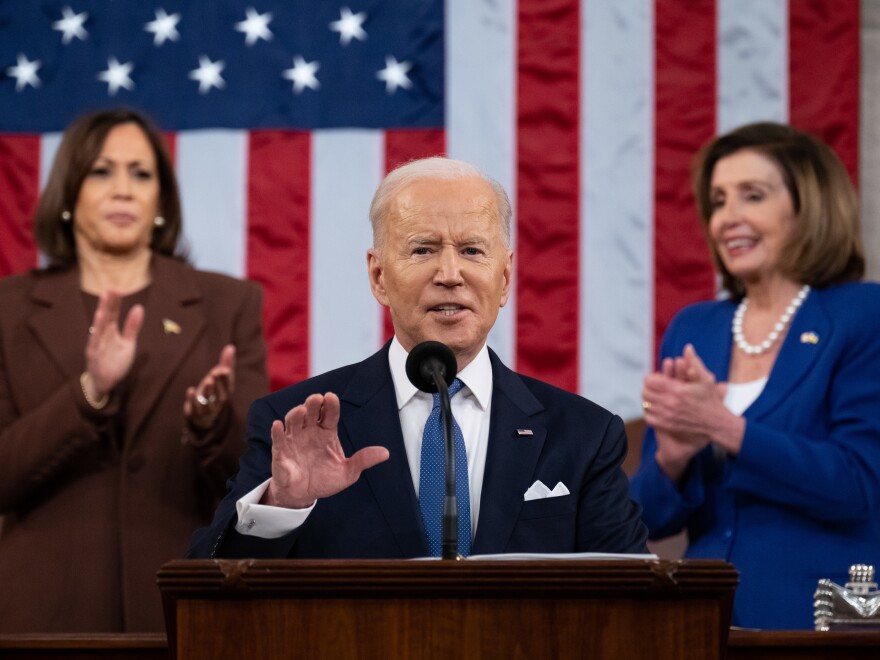
Renee Haltom, vice president of research communications at the Federal Reserve Bank of Richmond, said people still feel the price increases although inflation has slowed.
“When they go to the grocery store, they still see that higher bill,” said Haltom. “It's still that higher price level that people are continuing to wrap their minds around.”
Fiscal policies enacted by lawmakers can affect prices and employment quickly, but the Federal Reserve’s monetary policy plays a critical role. By adjusting interest rates, purchasing bonds and establishing minimum requirements for bank reserves, the Fed’s slower but broader policy tools affect inflation and growth.
Both Sen. Tim Kaine, a Democrat running for his third term, and Leslie Mehta, the Democratic nominee for Virginia’s 1st Congressional District, said the federal Inflation Reduction Act and other legislation were among reasons why price increases had slowed.
“We still got to do more,” said Kaine of lowering costs, saying lawmakers should focus in particular on health care premiums, prescription drugs and student loan payments.
At a campaign stop in Bristol, Kaine’s Republican opponent Hung Cao did not address prices, inflation or job creation. His campaign website lists deregulation, protectionist politics with China and energy independence through coal use as ways to stimulate the economy.
Cao’s campaign manager said at the Bristol event that the candidate was not available for an interview. The Cao campaign did not respond to multiple requests for an interview afterward.
One of Virginia’s largest employers — the federal government — is also at stake this election. The campaign of former President Donald Trump has announced its intention to move 100,000 federal jobs out of the Washington, DC area. A September 2023 report by the Congressional Research Service said that about 140,000 Virginians were federal civilian employees. A similar amount lived in Maryland, and 160,000 lived in the District of Columbia.
Through a spokesperson, Eugene Vindman, Democratic nominee for Virginia’s 7th Congressional District, said tackling the cost of living would need a “multi-pronged” approach.
Including making sure large corporate monopolies do not continue their practice of price gouging,” he said. In Congress, I work to expand on the newly announced drug price negotiations between Medicare and pharmaceutical companies that will save Americans billions of dollars.”
Derrick Anderson, the Republican nominee for the 7th District, responded without specific policy steps he would take in office to address voters’ cost of living concerns: “I’ll work with anyone, regardless of party, to fight for our small businesses, which I believe are the key to economic growth.”
The campaign for incumbent 1st Congressional District Rep. Rob Wittman, a Republican, did not respond to multiple requests for interviews. (Jahd Khalil)
Editor’s note: The Richmond Federal Reserve is a nonpartisan organization. Its employees reflect their views on the economy and not on any political campaign or election.



